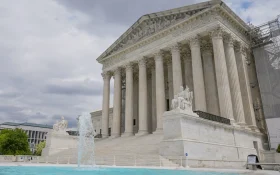The Supreme Court handed a victory to Native American tribes on Thursday in a case concerning federal funding for tribally-run health care programs under self-determination contracts.
In a 5-4 ruling, the high court sided with two tribes who argued the federal government must cover certain administrative costs, like billing outside insurers, when tribes take over running their own health services as allowed by law.
Writing for the majority, Chief Justice John Roberts stated not reimbursing those overhead expenses “forces tribes to pay a penalty for pursuing self-determination” under the Indian Self-Determination and Education Assistance Act.
The two plaintiff tribes, the San Carlos Apache from Arizona and Northern Arapaho of Wyoming, had petitioned for the government to cover millions in costs they incurred over several years handling administrative duties like processing Medicare, Medicaid and private insurance claims.
While the Indian Health Service paid the tribes to directly provide medical services, it didn’t factor in overhead costs associated with third-party billing that federal agencies normally handle.
The Department of Health and Human Services had argued it shouldn’t be responsible for those ancillary administrative expenses, estimating it could total between $800 million and $2 billion annually across all self-governance tribes if required to cover it.
But the Supreme Court majority disagreed, with Roberts writing that covering such costs is “necessary to prevent a funding gap” for tribes exercising their self-determination rights over health care operations.
“The extra federal money that the Court today green-lights does not come free,” cautioned Justice Brett Kavanaugh in a dissent joined by three other conservative justices. He argued Congress, not courts, should decide “those difficult appropriations decisions and tradeoffs.”
Tribal advocates celebrated the ruling as advancing sovereignty and health equity aims by ensuring parity in federal funding regardless of whether medical services are administered directly by the chronically underfunded Indian Health Service or contracted to tribes themselves.
With most federally-recognized tribes now operating at least some of their own health programs, the decision could have significant financial impacts by removing overhead cost burdens that had strained resources for providing quality care in their communities.
While the dissenting justices warned of fiscal implications, the majority framed its stance as upholding the practical realities and obligations underlying the self-determination laws empowering tribes to manage services meeting local health needs.
